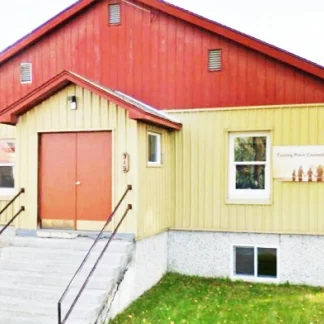Shades Of Growth Substance Abuse Counseling
Shades Of Growth Substance Abuse Counseling is a private rehab located in Fairba...
Turning Point Counseling Services is an addiction treatment center in Fairbanks, Alaska that offers an Intensive Outpatient Program (IOP), general outpatient treatment, and aftercare. Turning Point is LGBTQ+ informed and integrates a wide range of evidence-based treatments for substance use disorder, including unique approaches such as brainspotting and equine-assisted psychotherapy.
At Turning Point, outpatient treatment starts with an intensive outpatient program and steps down to general outpatient treatment and aftercare. The first phase is an eight-week IOP program with nine hours of treatment per week, and the four-week step-down phase includes two therapy sessions per week. Treatment includes individual and group therapy, patient education and relapse prevention, and evidence-based complementary therapies, such as brainspotting and equine therapy.
During aftercare, participants attend a weekly group meeting to help them maintain their recovery and incorporate their new habits into daily life. Participants can return to previous phases if necessary to address new concerns and solidify their commitment to their new substance-free lifestyle.
Turning Point accepts VA coverage and some private insurance plans. They are not able to accept TRICARE. Be sure to check with your insurance provider to verify that they cover the Turning Point program and to find out about any out-of-network benefits.
Contact us for more information: (907) 374-7776

Connect with Turning Point Counseling Services by calling their admissions team directly.
(907) 374-7776 Website Get DirectionsThe Commission on Accreditation of Rehabilitation Facilities (CARF) is a non-profit organization that specifically accredits rehab organizations. Founded in 1966, CARF's, mission is to help service providers like rehab facilities maintain high standards of care.
CARF Accreditation: Yes
Whether a marriage or other committed relationship, an intimate partnership is one of the most important aspects of a person's life. Drug and alcohol addiction affects both members of a couple in deep and meaningful ways, as does rehab and recovery. Couples therapy and other couples-focused treatment programs are significant parts of exploring triggers of addiction, as well as learning how to build healthy patterns to support ongoing sobriety.
Research clearly demonstrates that recovery is far more successful and sustainable when loved ones like family members participate in rehab and substance abuse treatment. Genetic factors may be at play when it comes to drug and alcohol addiction, as well as mental health issues. Family dynamics often play a critical role in addiction triggers, and if properly educated, family members can be a strong source of support when it comes to rehabilitation.
Group therapy is any therapeutic work that happens in a group (not one-on-one). There are a number of different group therapy modalities, including support groups, experiential therapy, psycho-education, and more. Group therapy involves treatment as well as processing interaction between group members.
In individual therapy, a patient meets one-on-one with a trained psychologist or counselor. Therapy is a pivotal part of effective substance abuse treatment, as it often covers root causes of addiction, including challenges faced by the patient in their social, family, and work/school life.
Research clearly demonstrates that recovery is far more successful and sustainable when loved ones like family members participate in rehab and substance abuse treatment. Genetic factors may be at play when it comes to drug and alcohol addiction, as well as mental health issues. Family dynamics often play a critical role in addiction triggers, and if properly educated, family members can be a strong source of support when it comes to rehabilitation.
Group therapy is any therapeutic work that happens in a group (not one-on-one). There are a number of different group therapy modalities, including support groups, experiential therapy, psycho-education, and more. Group therapy involves treatment as well as processing interaction between group members.
In individual therapy, a patient meets one-on-one with a trained psychologist or counselor. Therapy is a pivotal part of effective substance abuse treatment, as it often covers root causes of addiction, including challenges faced by the patient in their social, family, and work/school life.
Group therapy is any therapeutic work that happens in a group (not one-on-one). There are a number of different group therapy modalities, including support groups, experiential therapy, psycho-education, and more. Group therapy involves treatment as well as processing interaction between group members.
In individual therapy, a patient meets one-on-one with a trained psychologist or counselor. Therapy is a pivotal part of effective substance abuse treatment, as it often covers root causes of addiction, including challenges faced by the patient in their social, family, and work/school life.
In individual therapy, a patient meets one-on-one with a trained psychologist or counselor. Therapy is a pivotal part of effective substance abuse treatment, as it often covers root causes of addiction, including challenges faced by the patient in their social, family, and work/school life.
Shades Of Growth Substance Abuse Counseling is a private rehab located in Fairba...
Pacific Rim Counseling provides outpatient mental health and addiction recovery ...
Shades Of Growth is a private rehab located in Fairbanks, Alaska. Shades Of Grow...
Life Givers is a private rehab located in Fairbanks, Alaska. Life Givers special...